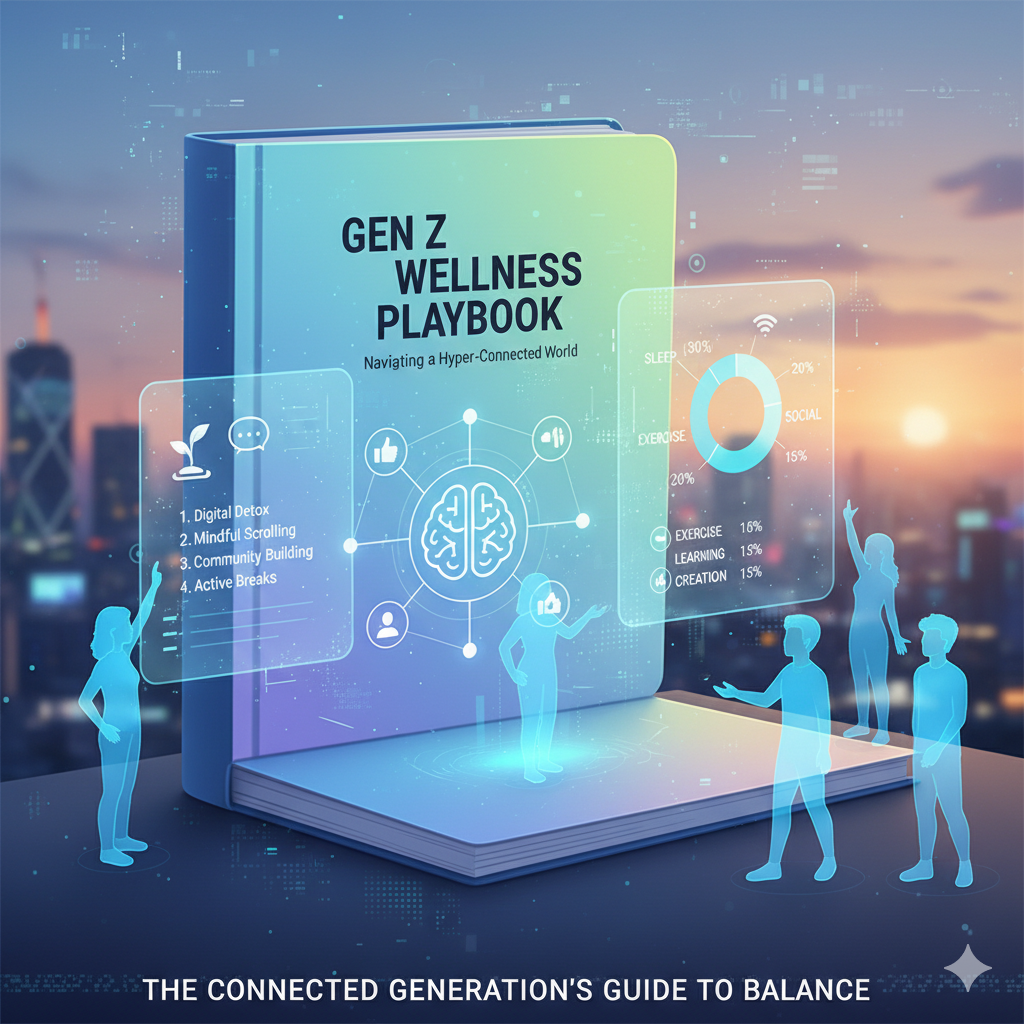
Gen Z's Real-Talk Health Playbook: Navigating Wellness in a Hyper-Connected World
Share
Gen Z is redefining wellness, moving past aesthetic trends towards genuine mental well-being, social impact, and sustainable habits [1]. However, this generation also grapples with unprecedented levels of anxiety, loneliness, and the constant pressure of digital comparison [2, 3]. Achieving optimal health for Gen Z isn't about perfection; it's about building a resilient, authentic, and balanced life. This playbook offers actionable strategies, mindsets, and smart choices to thrive in your unique world.
Digital-First Wellness: Reclaiming Your Online & Offline Self
For Gen Z, health strategies must acknowledge and actively integrate with their digital native existence.
The "Digital Audit" & Mindful Scrolling: Your phone is an extension of you, but it shouldn't control you.
- Audit Your Apps: Regularly review screen time and app usage. Identify which apps genuinely serve you and which drain your energy or foster comparison [4].
- Curate Your Feed for Good: Follow creators, communities, and content that inspire, educate, or bring joy. Actively mute or unfollow accounts that trigger negative emotions or unrealistic expectations [5].
- Scheduled Disconnects: Implement "tech-free zones" (e.g., mealtimes, an hour before bed, during social gatherings) and "digital sabbaticals" – short periods to completely disconnect.
- The 20-20-20 Rule (Eye Health): For every 20 minutes spent looking at a screen, look at something 20 feet away for 20 seconds. This helps prevent digital eye strain, a common issue for screen-heavy users [6].
Movement that Fits Your Vibe: Forget rigid gym routines. Gen Z seeks movement that’s enjoyable, expressive, and integrated into daily life.
- "Movement Snacks": Embrace short bursts of activity that feel good – dancing to your favorite song, a brisk walk between classes, or bodyweight exercises during study breaks [7].
- Social & Experiential Fitness: Group fitness classes (spin, yoga), sports, hiking with friends, or even active video games can make movement a social and engaging experience.
- Prioritize Mobility & Flexibility: Combat desk-related stiffness with stretching, foam rolling, or beginner yoga to support long-term physical comfort and prevent injury.

Authentic Choices: Fueling Your Body and Mind
Gen Z values transparency, ethical consumption, and mental well-being. Their health choices reflect these priorities.
Nutrition for Energy & Planet: Eating well isn't just about macros; it's about impact and feeling good.
- Plant-Forward Power: Gen Z is leading the charge in plant-based and flexitarian diets [8]. Focus on incorporating diverse fruits, vegetables, whole grains, and legumes for sustained energy, gut health, and environmental benefits.
- Mindful Snacking: Opt for nutrient-dense snacks (fruits, nuts, Greek yogurt) over ultra-processed options that lead to energy crashes and contribute to chronic inflammation [9].
- Hydration as a Foundation: Water isn't just essential; it's the simplest "hack" for better focus, mood, and skin. Keep a reusable water bottle handy.
Mental Health as a Priority: Gen Z is the first generation to openly discuss and de-stigmatize mental health challenges.
- Radical Self-Care: This isn't just bubble baths; it's setting boundaries, saying no, seeking professional help when needed, and protecting your peace [10].
- Therapy & Resources: Utilize school counseling services, virtual therapy apps, or online mental health platforms. Recognizing when to ask for help is a sign of strength, not weakness.
- Community & Connection: Actively seek out supportive in-person communities (clubs, volunteer groups, shared interest groups) to counter feelings of loneliness and build genuine connections.

Sustainable Support: Smart Habits for Long-Term Thriving
Gen Z understands that true well-being is a marathon, not a sprint, requiring consistent, sustainable efforts.
Sleep for Success: In a world that never sleeps, prioritizing rest is a rebellious act of self-care.
- Consistent Sleep Schedule: Try to go to bed and wake up around the same time each day, even on weekends, to regulate your circadian rhythm [11].
- Power Down Rituals: Create a calming pre-sleep routine – reading a physical book, gentle stretching, listening to a podcast, or journaling. Avoid screens and stimulating content for at least 30-60 minutes before bed.
- Optimize Your Sleep Space: Darken your room, keep it cool, and minimize noise.
Smart Supplementation (When Needed): While a balanced diet is primary, certain supplements can fill common gaps.
- Omega-3s: Essential for brain health, mood regulation, and reducing inflammation, often lacking in plant-heavy diets [12].
- Vitamin B Complex: Crucial for energy metabolism and managing stress, especially during demanding periods (e.g., exams) [13].
- Ashwagandha or L-Theanine: Adaptogens or amino acids to help manage stress and promote calm without drowsiness [14]. (Consult a healthcare professional before starting any supplements).
References
[1] Deloitte. (2023). The Deloitte Global 2023 Gen Z and Millennial Survey.
[2] American Psychological Association. (2023). Stress in America 2023: A new generation of challenges.
[3] Pew Research Center. (2020). Most U.S. Teens See Social Media as Having a Largely Negative Effect on People Their Age.
[4] UCLA Health. (2020). Digital Detox: Steps to Unplugging From Your Devices.
[5] Common Sense Media. (2018). Social Media, Social Life: Teens Reveal Their Top Experiences and Feelings.
[6] American Academy of Ophthalmology. (n.d.). Computers, Digital Devices and Eye Strain.
[7] Harvard Health Publishing. (2021). What are 'exercise snacks?'.
[8] Statista. (2023). Share of consumers by generation who follow specific diets in the U.S. 2023.
[9] Harvard T.H. Chan School of Public Health. (n.d.). The Nutrition Source: Ultra-Processed Foods.
[10] Mental Health America. (n.d.). Radical Self-Care: Prioritizing Your Well-being.
[11] Centers for Disease Control and Prevention (CDC). (n.d.). Tips for Better Sleep.
[12] National Institutes of Health (NIH). (2022). Omega-3 Fatty Acids Fact Sheet for Health Professionals.
[13] Mount Sinai. (n.d.). Vitamin B Complex.
[14] Healthline. (2023). What Is Ashwagandha? Benefits, Side Effects, and Dosage.
Let me know which infographic you'd like me to generate first!
